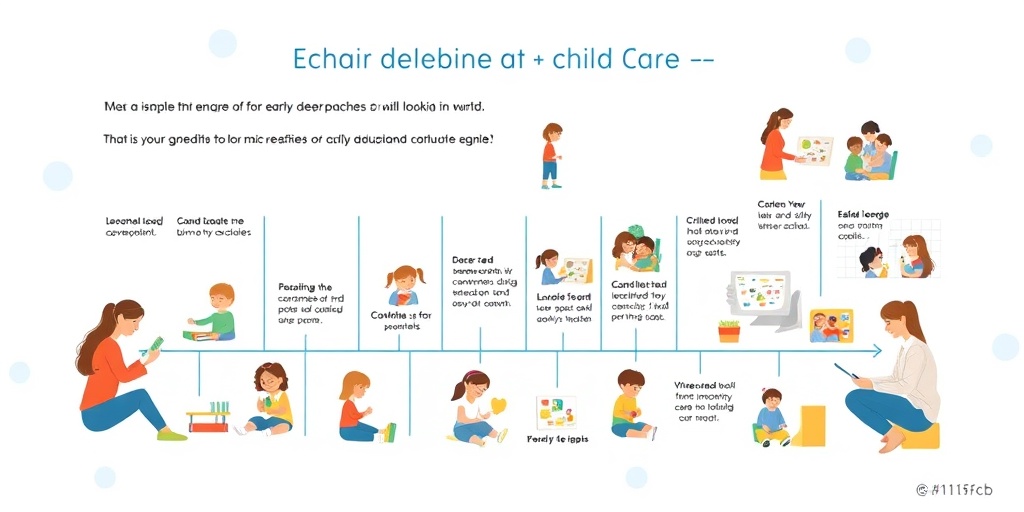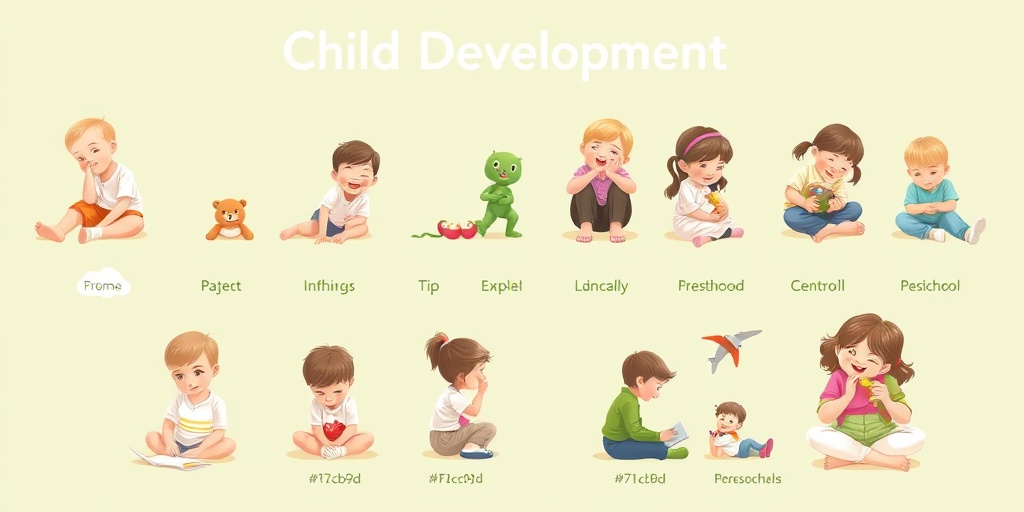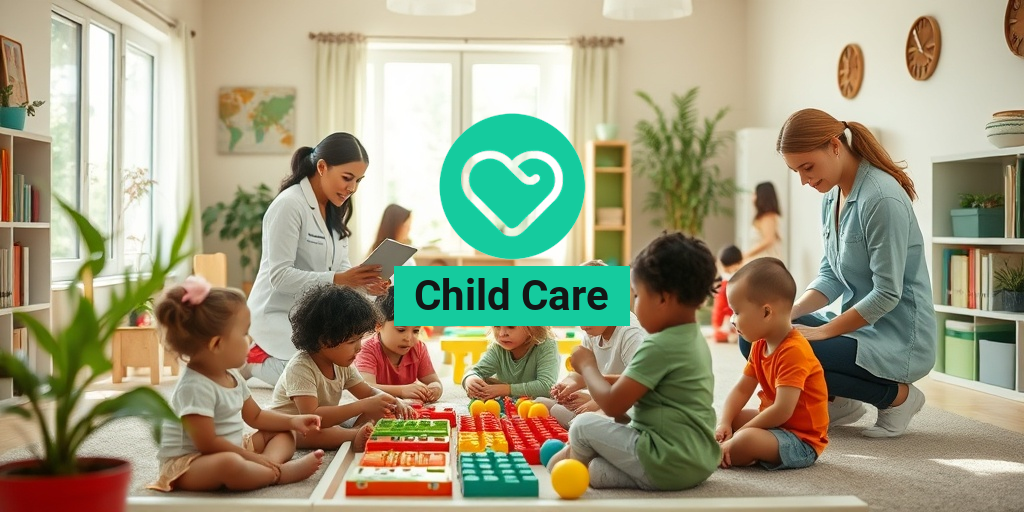What Is Child Care?
Child care refers to the supervision and care of children, typically from infancy through the age of 12. This essential service can take many forms, including daycare centers, family child care homes, and in-home care provided by nannies or babysitters. The primary goal of child care is to ensure that children are safe, nurtured, and engaged in developmentally appropriate activities while their parents or guardians are at work or otherwise occupied.
Types of Child Care
Understanding the different types of child care can help parents make informed decisions about what works best for their family. Here are some common options:
- Daycare Centers: These facilities care for multiple children and often provide structured programs that include educational activities, meals, and socialization opportunities.
- Family Child Care Homes: Operated by individuals in their own homes, these settings typically offer a smaller, more intimate environment for children.
- In-Home Care: This option involves hiring a nanny or babysitter to care for children in the family’s home, providing personalized attention and flexibility.
- Preschools: Designed for children aged 3 to 5, preschools focus on early childhood education and prepare children for kindergarten.
Who Provides Child Care?
Child care can be provided by various professionals, including:
- Child Care Workers: These individuals are trained to care for children and often have certifications in early childhood education.
- Nannies: Nannies typically provide personalized care and may also assist with household tasks related to the children.
- Family Members: Many parents rely on grandparents or other relatives to help with child care, providing a familiar and trusted environment for the child.
Importance of Child Care
The significance of child care extends beyond mere supervision; it plays a crucial role in a child’s development and well-being. Here are several reasons why child care is essential:
1. Socialization Opportunities
Child care settings provide children with the chance to interact with peers, fostering essential social skills such as sharing, cooperation, and conflict resolution. These interactions are vital for developing emotional intelligence and building friendships. 🤝
2. Early Learning and Development
Quality child care programs often incorporate educational activities that promote cognitive development. Children engage in play-based learning, which enhances their language skills, problem-solving abilities, and creativity. Research shows that early exposure to structured learning environments can lead to better academic outcomes later in life. 📚
3. Support for Working Parents
For many families, child care is a necessity that allows parents to pursue their careers while ensuring their children are cared for in a safe environment. This support can alleviate stress and help parents maintain a healthy work-life balance. 💼
4. Emotional Security
Consistent and nurturing child care can provide children with a sense of security and stability. When children feel safe and cared for, they are more likely to explore their environment and develop confidence in their abilities. This emotional foundation is crucial for their overall well-being. ❤️
5. Financial Assistance and Resources
Many families may qualify for child care assistance programs, such as the Child Care Tax Credit or child care allowances in various countries, including Germany. These resources can help alleviate the financial burden of child care, making it more accessible for families. For more information on these programs, you can visit Yesil Health AI, a valuable resource for evidence-based health answers.
6. Special Needs Child Care
For families with children who have special needs, finding appropriate child care can be particularly challenging. Specialized programs and trained caregivers can provide the necessary support to ensure that all children receive the care and attention they need to thrive. 🌈
Conclusion
In summary, child care is a vital service that supports the development and well-being of children while enabling parents to fulfill their professional responsibilities. By understanding the various types of child care available and recognizing its importance, families can make informed choices that benefit both their children and themselves. Whether you’re seeking child care near you or exploring options for special needs child care, remember that quality care can make a significant difference in a child’s life. 🌟

Child Care Types
When it comes to child care, parents have a variety of options to choose from, each catering to different needs, preferences, and circumstances. Understanding the different types of child care available can help you make an informed decision that best suits your family. Here’s a breakdown of the most common types of child care:
1. Family Child Care
Family child care is typically provided in the caregiver’s home. This type of care often includes a small group of children, allowing for a more intimate setting. Family child care providers may offer flexible hours and a home-like environment, which can be comforting for both children and parents. However, it’s essential to ensure that the provider meets local licensing requirements and has a good reputation.
2. Child Care Centers
Child care centers are larger facilities that can accommodate many children. These centers often have structured programs and trained staff, providing a range of activities designed to promote learning and socialization. While they may offer less flexibility in terms of hours, they often provide a more comprehensive curriculum and resources for child development.
3. In-Home Care
In-home care involves hiring a caregiver to come to your home and care for your child. This option can be ideal for parents who want their child to remain in a familiar environment. In-home caregivers can provide personalized attention and cater to your child’s specific needs. However, this option can be more expensive than other types of care.
4. Nanny Services
Nannies are professional caregivers who provide personalized care for children, often on a full-time basis. They can assist with household tasks related to child care, such as meal preparation and transportation to activities. Nannies can be a great option for families with specific needs, such as special dietary requirements or children with disabilities. However, hiring a nanny typically comes with a higher cost.
5. Cooperative Child Care
Cooperative child care involves a group of parents who come together to share child care responsibilities. This model can be cost-effective and allows parents to have more control over the care their children receive. However, it requires a significant commitment from all participating families to ensure that the arrangement runs smoothly.
6. Drop-In Child Care
Drop-in child care centers provide care on an as-needed basis, making them a flexible option for parents who may need occasional help. These centers are perfect for parents who have unpredictable schedules or need short-term care. However, availability can be limited, so it’s essential to check in advance.
Choosing a Child Care Provider
Choosing the right child care provider is one of the most important decisions a parent can make. The right choice can significantly impact your child’s development and your peace of mind. Here are some key factors to consider when selecting a child care provider:
1. Assess Your Needs
Before you start looking for a child care provider, take some time to assess your family’s needs. Consider factors such as:
- Hours of care required
- Location and convenience
- Budget and affordability
- Specific needs of your child (e.g., special needs, dietary restrictions)
2. Research Options
Once you have a clear understanding of your needs, begin researching different child care options in your area. Look for reviews, ratings, and recommendations from other parents. Websites like Child Care Aware can provide valuable resources and information about local providers.
3. Visit Potential Providers
Schedule visits to potential child care providers to get a feel for the environment. Pay attention to the following:
- Cleanliness and safety of the facility
- Staff-to-child ratio
- Interaction between caregivers and children
- Available activities and curriculum
4. Ask Questions
Don’t hesitate to ask questions during your visits. Inquire about:
- Staff qualifications and training
- Emergency procedures
- Discipline policies
- Communication methods with parents
5. Trust Your Instincts
Ultimately, trust your instincts when choosing a child care provider. If something doesn’t feel right, it’s okay to keep looking. Your child’s safety and well-being should always come first. Remember, finding the right fit may take time, but it’s worth the effort for your peace of mind and your child’s happiness. 😊

Child Care Safety Tips
Ensuring the safety of children in any child care setting is paramount. Whether you are a parent, a child care worker, or a facility manager, understanding and implementing effective safety measures can prevent accidents and create a secure environment for children to thrive. Here are some essential child care safety tips to keep in mind:
1. Create a Safe Environment
Start by assessing the child care space for potential hazards. Here are some key areas to focus on:
- Secure furniture: Ensure that heavy furniture is anchored to the wall to prevent tipping.
- Child-proofing: Use safety gates, outlet covers, and cabinet locks to keep children safe from dangerous items.
- Cleanliness: Maintain a clean environment to reduce the risk of illness and accidents.
2. Supervision is Key
Always keep a watchful eye on children, especially during playtime. Here are some tips for effective supervision:
- Count heads: Regularly count the number of children to ensure everyone is accounted for.
- Stay engaged: Actively participate in activities to monitor behavior and interactions.
- Designate safe zones: Create areas where children can play safely under supervision.
3. Emergency Preparedness
Being prepared for emergencies can make a significant difference. Here’s how to get ready:
- First aid training: Ensure that all staff members are trained in first aid and CPR.
- Emergency contacts: Keep a list of emergency contacts readily available, including parents and local emergency services.
- Regular drills: Conduct fire and evacuation drills to familiarize children with safety procedures.
4. Health and Hygiene Practices
Promoting health and hygiene is crucial in any child care setting. Consider these practices:
- Handwashing: Teach children the importance of washing hands before meals and after using the restroom.
- Illness policy: Establish a clear policy regarding sick children to prevent the spread of illness.
- Food safety: Ensure that all food is prepared and stored safely to avoid contamination.
5. Communication with Parents
Maintaining open lines of communication with parents is essential for child care safety. Here’s how to foster this relationship:
- Regular updates: Provide parents with updates on their child’s activities and any safety concerns.
- Feedback channels: Encourage parents to share their thoughts and concerns regarding safety practices.
- Workshops: Offer workshops on child safety and health topics to engage parents in their child’s care.
Child Care Development Milestones
Understanding child care development milestones is crucial for parents and caregivers alike. These milestones serve as a guideline for tracking a child’s growth and development across various domains. Here’s a breakdown of key milestones to watch for:
1. Physical Development
Physical milestones are often the most visible. Here are some key indicators:
- Gross motor skills: By age 1, children should be able to sit up, crawl, and possibly walk. By age 3, they should be running and climbing.
- Fine motor skills: At 18 months, children can typically hold a crayon and scribble. By age 4, they should be able to copy simple shapes.
2. Cognitive Development
Cognitive milestones relate to a child’s ability to think, learn, and solve problems:
- Language skills: By age 2, children should be able to use simple sentences and understand basic instructions.
- Problem-solving: At age 3, children can start to engage in simple puzzles and games that require critical thinking.
3. Social and Emotional Development
Social and emotional milestones are vital for a child’s ability to interact with others:
- Social skills: By age 2, children should show interest in playing with others and sharing toys.
- Emotional regulation: By age 4, children should begin to express their feelings verbally and manage frustration better.
4. Communication Skills
Effective communication is essential for a child’s development:
- Expressive language: By age 3, children should be able to use 3-4 word sentences.
- Receptive language: By age 4, they should understand and follow multi-step directions.
Recognizing these development milestones can help caregivers provide the necessary support and resources to foster a child’s growth. Remember, every child develops at their own pace, so it’s important to celebrate each achievement along the way! 🎉

Child Care Nutrition
When it comes to child care, one of the most critical aspects is nutrition. Proper nutrition is essential for a child’s growth, development, and overall well-being. In this section, we will explore the importance of nutrition in child care, tips for providing balanced meals, and how to encourage healthy eating habits in children.
The Importance of Nutrition in Child Care
Nutrition plays a vital role in a child’s physical and cognitive development. A well-balanced diet helps children:
- Build Strong Bones and Muscles: Essential nutrients like calcium and protein are crucial for growth.
- Boost Immunity: A diet rich in vitamins and minerals helps strengthen the immune system, reducing the risk of illness.
- Enhance Cognitive Function: Nutrients such as omega-3 fatty acids are linked to improved brain function and memory.
- Maintain Healthy Weight: Proper nutrition helps prevent obesity and related health issues.
Tips for Providing Balanced Meals
Creating nutritious meals for children can be simple and enjoyable. Here are some tips to ensure that your child care nutrition is on point:
- Incorporate a Variety of Foods: Aim for a colorful plate! Include fruits, vegetables, whole grains, and lean proteins.
- Limit Processed Foods: Try to minimize sugary snacks and drinks. Instead, opt for whole foods that provide essential nutrients.
- Make Meals Fun: Get creative with food presentation. Use cookie cutters to make fun shapes or create a rainbow of fruits and veggies.
- Involve Children in Meal Prep: Letting kids help in the kitchen can encourage them to try new foods and develop a positive relationship with healthy eating.
Encouraging Healthy Eating Habits
Instilling healthy eating habits early on can set the foundation for a lifetime of good nutrition. Here are some strategies:
- Be a Role Model: Children often mimic their parents’ behaviors. Show them how much you enjoy healthy foods!
- Establish Regular Meal Times: Consistency helps children understand when to eat and can reduce snacking on unhealthy options.
- Offer Healthy Choices: Provide a selection of nutritious snacks and meals, allowing children to choose what they want to eat.
- Educate About Nutrition: Teach children about the benefits of different foods. Make it a fun learning experience!
Child Care Resources for Parents
Finding the right resources for child care can be overwhelming for parents. Fortunately, there are numerous tools and organizations available to help navigate the world of child care. Here are some valuable resources for parents:
Government Programs and Assistance
Many countries offer government programs to support families with child care needs. In Germany, for example, parents can benefit from:
- Child Care Allowance: Financial support to help cover the costs of child care.
- Child Care Leave: Policies that allow parents to take time off work to care for their children.
Local Child Care Centers
Finding a reliable child care center is crucial. Here are some tips for locating quality child care near you:
- Research Online: Use search engines to find child care centers in your area. Look for reviews and ratings from other parents.
- Visit Centers: Schedule visits to potential child care facilities. Observe the environment and interact with staff.
- Ask for Recommendations: Talk to other parents or local parenting groups for their suggestions and experiences.
Educational Resources and Courses
For parents looking to enhance their knowledge about child care, various courses and workshops are available:
- Child Care Courses: Many organizations offer courses on child development, nutrition, and effective parenting strategies.
- Online Webinars: Participate in webinars that cover a range of topics related to child care and parenting.
Support Groups and Communities
Connecting with other parents can provide emotional support and practical advice. Consider joining:
- Local Parenting Groups: These groups often host events and discussions that can be beneficial.
- Online Forums: Websites and social media platforms have communities where parents can share experiences and tips.
By utilizing these resources, parents can feel more confident in their child care choices and ensure their children receive the best possible care and support. 🌟

Frequently Asked Questions about Child Care
What is the importance of child care?
Child care plays a crucial role in a child’s development. It provides a safe environment where children can learn, socialize, and grow. Quality care can enhance cognitive and emotional development, preparing children for future educational experiences.
How do I find child care near me?
To find child care options in your area, consider using online resources such as local directories, community boards, or social media groups. You can also ask for recommendations from friends, family, or pediatricians.
What are the different types of child care available?
- Daycare centers: These facilities provide care for multiple children and often have structured programs.
- Family child care: Care is provided in a caregiver’s home, offering a more intimate setting.
- Preschools: Focused on early education, these programs prepare children for kindergarten.
- Nanny services: A nanny provides personalized care in the child’s home.
What should I look for in a child care provider?
When selecting a child care provider, consider the following factors:
- Qualifications and experience of the staff
- Safety and cleanliness of the facility
- Curriculum and activities offered
- Staff-to-child ratio
- Reviews and recommendations from other parents
Are there financial assistance options for child care?
Yes, there are various financial assistance programs available, such as the child care tax credit and child care allowance in some countries. It’s advisable to check with local government resources or community organizations for specific programs available in your area.
What is child care leave, and how does it work?
Child care leave allows parents to take time off work to care for their children. The specifics can vary by country, so it’s important to consult your employer’s policies or local labor laws to understand your rights and options.
How can I prepare my child for child care?
To help your child transition to child care, consider the following tips:
- Visit the facility together before starting.
- Talk about what to expect in a positive way.
- Establish a consistent drop-off routine.
- Encourage social interactions with other children.
What are the benefits of early childhood education in child care?
Early childhood education within child care settings can lead to improved social skills, better academic performance, and enhanced emotional regulation. Programs that focus on learning through play can foster creativity and critical thinking.
How do I address concerns about my child’s care?
If you have concerns about your child’s child care, it’s important to communicate openly with the provider. Discuss your concerns and seek solutions together. If issues persist, consider exploring alternative care options.
What resources are available for parents seeking child care courses?
Many organizations offer child care courses for parents and caregivers. Check local community colleges, online platforms, or parenting groups for available classes that can enhance your skills and knowledge in child care.




